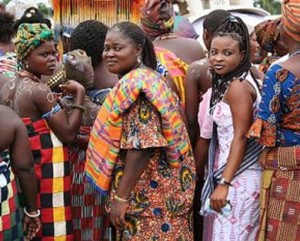Equality of political power by gender better in Ghana than Britain – Social Progress Index
 Ghana has outperformed the Great Britain, in areas such as Freedom of religion, Equality of political power by gender and equality of political power by social groups in the 2018 edition of the Social Progress Index.
Ghana has outperformed the Great Britain, in areas such as Freedom of religion, Equality of political power by gender and equality of political power by social groups in the 2018 edition of the Social Progress Index.
Each year, the Social Progress Imperative conducts a comprehensive review of all indicators included in the Social Progress Index framework to check data updates (which frequently include retroactive revisions) and whether new indicators have been published that are well-suited to describing social progress concepts.
This year’s Index shows that Ghana is better than the Great Britain when it comes to Freedom of religion, having scored 3.80762 out of 4.00 while Britain scored 3.74497. On equality of political power by gender, Ghana again is documented to be above the UK, scoring 2.55028 against 2.4986 for Britain. Social groups in Ghana are also better off than those in the UK in terms of equality of political power, as Ghana scored 3.17 out of 4 in Equality of political power by social groups while the UK scored 2.8728.
According to the report, in assessing religious freedom, the question, “Is there freedom of religion?” was asked and evaluated on a scale of 0 to 4. Where; 0 – Not respected by public authorities. Hardly any freedom of religion exists. Any kind of religious practice is outlawed or at least controlled by the government to the extent that religious leaders are appointed by and subjected to public authorities, who control the activities of religious communities in some detail.
1 – Weakly respected by public authorities. Some elements of autonomous organized religious practices exist and are officially recognized. But significant religious communities are repressed, prohibited, or systematically disabled, voluntary conversions are restricted, and instances of discrimination or intimidation of individuals or groups due to their religion are common.
2 – Somewhat respected by public authorities. Autonomous organized religious practices exist and are officially recognized. Yet, minor religious communities are repressed, prohibited, or systematically disabled, and/or instances of discrimination or intimidation of individuals or groups due to their religion occur occasionally.
3 – Mostly respected by public authorities. There are minor restrictions on the freedom of religion, predominantly limited to a few isolated cases. Minority religions face denial of registration, hindrance of foreign missionaries from entering the country, restrictions against proselytizing, or hindrance to access to or construction of places of worship.
4 – Fully respected by public authorities. The population enjoys the right to practice any religious belief they choose. Religious groups may organize, select, and train personnel; solicit and receive contributions; publish; and engage in consultations without undue interference. If religious communities have to register, public authorities do not abuse the process to discriminate against a religion and do not constrain the right to worship before registration.
On equality of political power by gender , “Is political power distributed according to gender?” was randomly asked and evaluated on a scale of 0 to 4, as follows.
0 – Men have a near-monopoly on political power, 1- Men have a dominant hold on political power. Women have only marginal influence, 2 – Men have much more political power but women have some areas of influence. 3 – Men have somewhat more political power than women. 4 – Men and women have roughly equal political power.
On perceived level of public sector corruption based on expert opinion corruption though, Ghana performed abysmally by scoring 40 out of 100; where 0 means highly corrupt and 100 means very clean.
According to data available from Institute for Health Metrics and Evaluation, Ghana records approximately 131 maternal deaths per 100,000 live births in women aged 10-54 years and 18 per cent of all Ghanaian children under age 5, suffer stunting growth.
Data also available from the UN Inter-Agency for Child Mortality suggests that, of every 1,000 live births, about 59 have the probability of dying between birth and exactly 5 years of age.
The report notes further that, of every 100,000 infections, 376 are likely not to survive the infection.
Overall, for the fifth year running, Ghana’s Social Progress Index has improved. Presently, Ghana’s standing is 60.30 per cent, having scored 59.07, 58.19, 57.75, 56.60 in 2017, 2016, 2015 and 2014 respectively.
By Bismark Elorm Addo
Copyright ©2018 by Creative Imaginations Publicity
All rights reserved. This news item or any portion thereof may not be reproduced or used in any manner whatsoever without the express written permission of the publisher except for the use of brief quotations in reviews.
